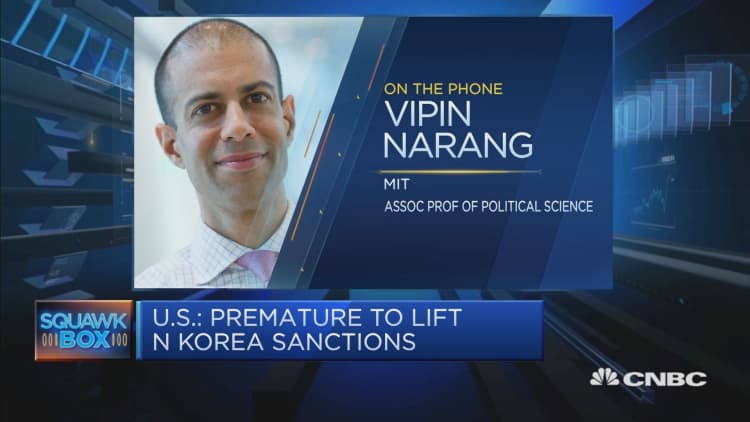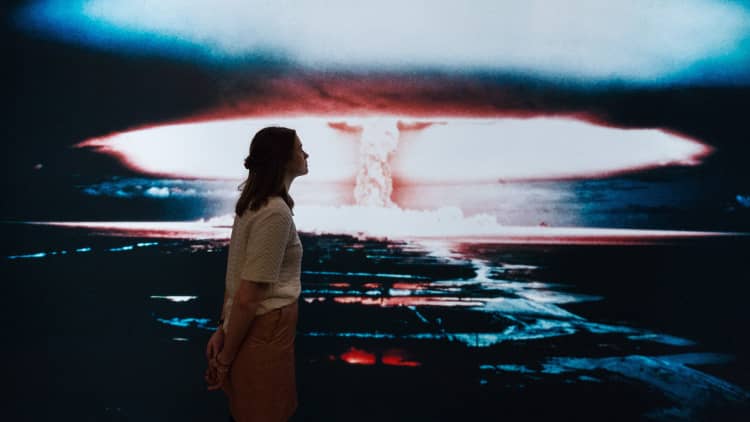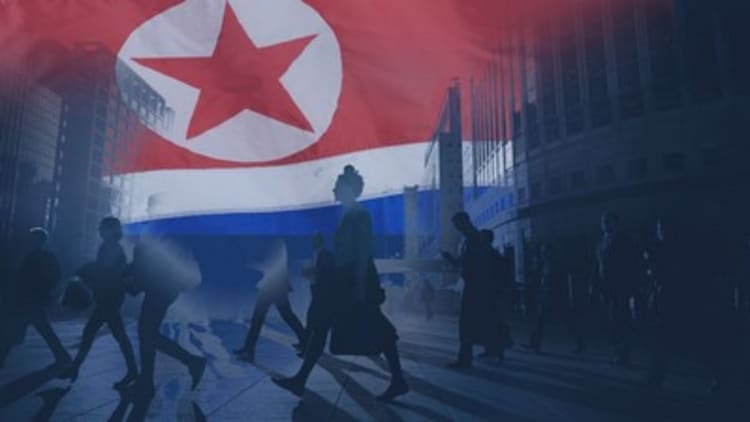North Korea's Christmas gift for the U.S. may be a long-ranged missile, according to a MIT professor.
Vipin Narang, associate professor of political science at MIT, told CNBC's "Squawk Box" that North Korean leader Kim Jong Un has been sending a message to U.S. President Donald Trump as Pyongyang tested more short-range missiles throughout the summer and fall than in any other year in its history.
"The message was loud and clear. This was Kim Jong Un's maximum pressure campaign on President Trump. Like if you're not hearing me about changing your calculations and giving sanctions relief and security guarantee and getting rid of the hostile policy, I can show you what long-range missiles look like," said Narang.

Kim had previously given the United States a vague deadline for the end of this calendar year to change course on denuclearization talks. Kim has since referenced the deadline multiple times without providing further detail since abruptly ending talks with Trump in Hanoi earlier this year.
Earlier this month, state media quoted a top North Korean official saying "it is entirely up to the U.S. what Christmas gift it will select to get."
"Now, with the end of the year approaching we may end up seeing what Kim Jong Un can do when he turns up the volume," The professor added "North Korea does not often bluff, and Kim Jong Un has so far stayed true to his pledges and words."
Another expert previously told CNBC that Pyongyang could test an intercontinental ballistic missile on Christmas Day.
'Re-nuclearization'
Narang noted that the isolated nation has been testing at facilities that were "supposedly dismantled."
"And the significance of conducting tests at the sites that were taken down is re-nuclearization. He's reversing steps he's taken and this is a calibrated step," he added.
In a Wednesday note, Eurasia Group's Asia director Scott Seaman wrote "tensions are rising more quickly than we anticipated ... odds of Trump and Kim cutting a denuclearization deal before the 2020 US election have decreased."

Reuters reported that the U.S. special envoy for North Korea, Stephen Biegun, urged Pyongyang on Monday to return offers of talks. He also dismissed Kim's year-end deadline and emphasized Washington's willingness to discuss "all issues of interest," according to Reuters.
But looking ahead, Seaman does not seem to be optimistic for 2020, "The US will likely ramp up efforts to show it is coordinating closely with allies like Japan and South Korea and also talking with other key players such as China and Russia." Meanwhile, "Kim will likely try to outdo US diplomacy with his own overtures to China, Russia, and other countries," said Seaman.
Pyongyang's allies
China and Russia on Monday proposed the U.N. Security Council lift a ban on North Korea exporting statues, seafood and textiles, according to a draft resolution seen by Reuters.
Narang said China and Russia likely want to formally remove the sanctions all together. That would allow Kim to rely on the economic and energy trade with the two nations, which seem willing to diplomatically back North Korea.
But Narang said, ultimately "there's a line" for China and Russia, too. He said China's position seems to be "you can go back to testing missiles just don't test a nuclear weapon," explaining that appears to be Beijing's "red line."

Furthermore, Eurasia Group's Seaman predicted that North Korea's increasing aggression may lead to the opposite outcome of what they are aiming for now. The U.S. is likely to look for ways to exert more pressure on Pyongyang by more strictly enforcing sanctions or creating new ones instead of removing them, said Seaman.
"Trump will likely want to get tougher on individuals and entities in China (and elsewhere) that help North Korea evade sanctions. But he will be inclined to take a cautious approach, fearing that moving too fast and hard would risk derailing the Phase One trade deal with Beijing," he wrote in the note.


